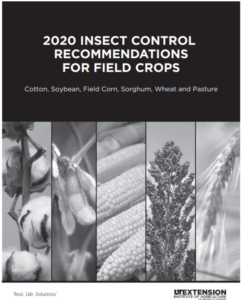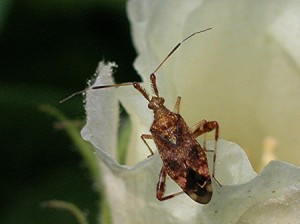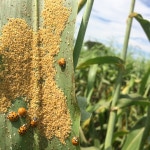 The 2020 version of PB 1768, Insect Management Recommendations for Field Crops (and pasture), is now available. The guide has gone through substantial revision this year and closely matches the content on the mobile friendly Disease and Insect Field Guides at https://guide.utcrops.com/. Hard copies will be available soon and distributed through county extension offices and at various educational meetings.
The 2020 version of PB 1768, Insect Management Recommendations for Field Crops (and pasture), is now available. The guide has gone through substantial revision this year and closely matches the content on the mobile friendly Disease and Insect Field Guides at https://guide.utcrops.com/. Hard copies will be available soon and distributed through county extension offices and at various educational meetings.
Category Archives: Sorghum
Insect Calls of the Week (July 3, 2019)

Plant bugs … I’d classify the overall plant bug pressure in cotton as average, although we are seeing a few more clouded plant bugs than in recent years. Until bolls are present, count tarnished and clouded plant bugs the same. Once bolls are present, I suggest counting clouded plant bugs as equivalent to 1.5 tarnished plant bugs when making a treatment decision, primarily because clouded plant bugs are more inclined to feed on bolls. As cotton begins blooming, Continue reading
Emergency Exemption (Section 18) Granted for Sivanto in Sweet Sorghum

The Tennessee Department of Agriculture and the EPA has again approved a Section 18 that allows the use of Sivanto prime on sweet sorghum for the control of sugarcane aphids during 2019. This pest is potentially devastating for those growing sweet sorghum for molasses or other uses, and Sivanto prime is an excellent any the only available insecticide option in this crop. Specific requirement for it’s use are summarized below and detailed in the Continue reading
Section 18 Approved for Sivanto in Sweet Sorghum
The EPA has approved Tennessee’s Section 18 request for Sivanto (a.k.a. Sivanto prime) in sweet sorghum for control of sugarcane aphid. This product is already fully labeled on grain sorghum, but requires an emergency use exemption is sweet sorghum. Sivanto is the only insecticide labeled in sweet sorghum for control of the sugarcane aphid. Specific use requirements are listed below. Continue reading
Moth Trapping Results and Other Reminders
A reminder that weekly moth tap catches for corn earworm (bollworm), tobacco budworm, and southwestern corn borer can be found under the quick links menu under Moth Trapping Data.
With the exception of southwestern corn borers (SWCB) in some locations , we’ve not been catching many moths. Now would be a good time to scout the whorls of any non-Bt corn for the presence of corn borers. Remember that the treatment threshold during the whorl stage is when 5% of plants are infested with SWCB.
Also remember that UT Pest Guides are available at http://guide.utcrops.com/. They provide the latest information of pest identification, sampling, and management in a mobile-friendly, app-like format.
Sorghum Hybrids with Tolerance to Sugarcane Aphid
Linked below is a list of sorghum hybrids that have exhibited at least some tolerance to the sugarcane aphid. This was shared by Brent Bean of the Sorghum Checkoff program. To be included on this list, the seed company first must recommend the hybrid as having sugarcane aphid tolerance. Second, there must be independent data, usually from university or USDA trials, that confirm tolerance. Check the Sorghum Checkoff website under hybrid selection for updates to the list. It is important to note that some hybrids will have more tolerance than others. Also, just because a hybrid in on the list does not mean it is suitable for our geography.
2018 Sorghum Hybrids with SCA Tolerance
UT Insect Management Guide for Field Crops
The 2018 Insect Control Recommendations for Field Crops (cotton, corn, soybean, wheat, sorghum, and pastures) can be found online on UTcrops.com. Insect and disease management recommendations for cotton and soybean are also available on the mobile-friendly Field Guide website at http://guide.utcrops.com/.
Suggestions: Add the UTcrops News Blog to your home screen for easy access to all these resources.
UT Extension County Meeting Schedule, January/February
 In addition to the East, Middle and West TN Grain Conferences and the Cotton Focus event, UT Extension is hosting a series of meetings to be held throughout the state to prepare growers for the upcoming season. These meetings will focus on variety selection, insect and plant disease management, weed management, and other current crop production topics.
In addition to the East, Middle and West TN Grain Conferences and the Cotton Focus event, UT Extension is hosting a series of meetings to be held throughout the state to prepare growers for the upcoming season. These meetings will focus on variety selection, insect and plant disease management, weed management, and other current crop production topics.
Below is a list of the production meetings to be held in January and February. Please contact your local UT Extension office for more details on time and location. Continue reading

